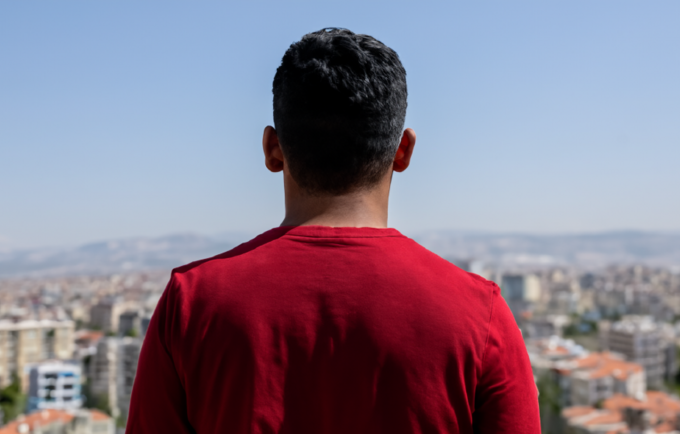The Syrian conflict continues to be one of the greatest human tragedies ever experienced. Since the beginning of the conflict, 6.8 million civilians have fled to other countries in search of safety. More than 300,000 civilians have lost their lives. Physical, sexual, psychological, economic; any form of violence is a violation of fundamental human rights and leaves deep scars. United Nations Population Fund, UNFPA Türkiye supports men and boys who have been exposed to and/or live at risk of violence including conflict-related sexual violence with the support of EU Humanitarian Aid.
“Whoever said anything, they would take him to torture. A few days later, they would bring him back, injured, and throw him into the ward. That person would pass away the next morning, and they would want us to deliver his body. It was very difficult to experience these things.”
Ahmed describes the days of violence that he experienced during the conflict in Syria with these words. He is one of the tens if not hundreds of thousands of people who have been subjected to violence due to the conflict in his country… Ahmed's story reveals the wounds caused by violence, trauma, and difficulties of starting a new life after such an experience.
Ahmed, who is 33 years old, fled to Türkiye from Syria in 2018. While trying to establish a new life with his family in Adana, he continues to struggle with the depression caused by what he had experienced in Syria. He hardly shares that he witnessed, and was even exposed to, inhumane treatment in Damascus, during the conflicts; “Torture is the hardest. I was exposed to all kinds of violence at the same time. I was thinking about death every second.”
Ahmed was forced to spend 6 years of his life in prison. He didn’t even have a name then. Instead, everyone was called with codes. “They called me 217 for 6 years,” says Ahmed. He spent 3 years of this period in an underground room of a prison without seeing the sunlight, together with 100 other people. Although it is difficult to describe what he went through, he mentions those days with the following words; “We were 100 people in a tiny room, and there was no place to sleep or sit. We used to take turns to sit and sleep.” He cannot forget a signboard in the prison, which says; “Who enters here is lost, who leaves here is newborn.”
Ahmed says that the violence and pain he witnessed left deep wounds in his soul, as much as his own experiences. He tells about what he witnessed; “Whoever said anything, they would take him to torture. A few days later, they would bring him back, injured, and throw him into the ward. That person would pass away the next morning, and they would want us to deliver his body. It was very difficult to experience such things,” and adds; “I could hear the voices of women and children asking for help, it was very painful to hear them.”
Ahmed’s family thought he was dead. He somehow got his freedom and reunited with them years later in Türkiye. Reuniting with his family and meeting with the UNFPA-supported service unit in Adana brought new hope for him for the first time after many years.
Towards a new life with hope
Ahmed says that when he met UNFPA’s supported service unit in Adana, carried out in cooperation with the Positive Living Association with financial support of EU Humanitarian Aid, he thought he might have a second chance. Ahmed has been receiving legal counseling, psychological support and health counseling from the center and is trying to leave the terrible memories behind.
He states that he has largely overcome the problems such as insomnia and anxiety attacks that he experienced before meeting the center thanks to the support he has taken. “I can’t even compare the first day I came here and today, there is a big difference. For the first time after many years, I have dreams. Now I want to get married and start a family,” he says.
UNFPA Türkiye’s Men & Boys project, which has been implementing in collaboration with Positive Living Association with the financial support of EU Humanitarian Aid, aim to provide support for refugee men and boys like Ahmed who have been subjected to sexual violence and/or at risk of sexual violence.
In two service units in Adana and İzmir, case management for sexual violence, psychosocial support, legal counseling, referral to external services, accompaniment and similar protection services are provided, and awareness-raising activities are organized. Service units are designed as safe spaces and aim to reach many more people in need through outreach work.
At the EU-funded service units, sexual and reproductive health services are also provided with the financial support from the Government of the United States as part of a holistic approach.

